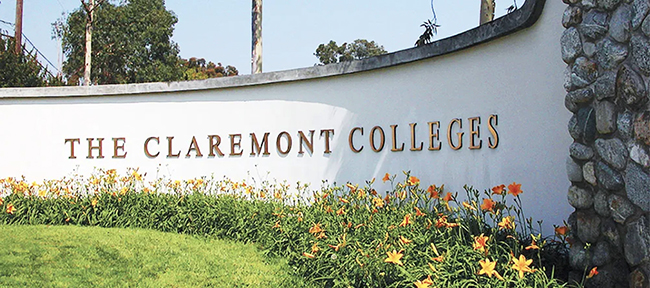Claremont Colleges to non-citizen students: return to U.S. before Trump inauguration

By Georgia Evrigenis | Special to the Courier
In anticipation of Donald Trump’s second term and with speculation growing over potential changes to U.S. immigration and travel policies, several undergraduate Claremont Colleges have issued statements affirming their commitment to supporting international students, those protected under Deferred Action for Childhood Arrivals, and undocumented students.
Though the president-elect has not yet made any concrete statements regarding travel bans, his policies may look similar to those of his first administration, where foreign nationals from several predominantly Muslim countries were unable to enter the United States. President Biden revoked the Trump travel bans — except the reverse ban prohibiting Americans from visiting North Korea — on his first day in office in 2021. Trump also tried to overturn DACA, but the Supreme Court rejected his attempt because the administration did not meet the “procedural requirements” to do so.
Nationwide, more than 408,000 college students are undocumented. There are also more than 1.1 million international students in the U.S., and this number is ever-increasing. Noncitizen students are worried about the changes the new administration may bring, and colleges across the country — including the Claremont Colleges — are trying to ease their fears.
On December 4, 2024, Claremont McKenna College’s Dean of Students office sent out an email to stakeholders outlining the situation. “Thus far, the President-Elect has not made sweeping statements about potential travel bans as was the case in 2016,” it read. “We have no current reason to believe that students will face travel restrictions into the U.S. However, out of an abundance of caution, we encourage students who are traveling from international locations, especially if you are not a U.S. citizen, to return to the U.S. by Sunday, January 19, 2025.
“Relative to the President-Elect’s comments on the deportation of undocumented immigrants, please note that, since 2017, California law (Senate Bill 54) severely limits state and local law enforcement from investigating, interrogating, detaining, detecting, or arresting persons for immigration enforcement purposes. In compliance with state law and federal law, CMC and The Claremont Colleges will provide maximum support to undocumented students.”
The college also offered confidential access to an immigration lawyer and a program “specifically designed for students who are ineligible for U.S. work authorization to participate in a fellowship and gain meaningful experiences that may not otherwise be afforded to them.” Fifteen percent of CMC students are nonresidents.
Lucy Meza, a junior at CMC, expressed her gratitude for the email. “Coming from Texas, where I have a magnitude of affected friends who are attending other institutions across the country, seeing that CMC has come out with a statement means a lot to me,” Meza said. “Even though DACA does not directly impact me, it is really important to me to see that the DACA and undocumented communities are being thought of and not brushed aside. I have friends at other state colleges who aren’t getting these emails.”
Pomona College President G. Gabrielle Starr published a statement on the school’s website on December 10, 2024 asking that international students, who make up 12% of the student body, return to the U.S. before Trump is sworn in January 20. “In light of uncertainties around potential changes to U.S. immigration-related policy, the safest way to avoid additional challenges re-entering the country is to be physically present in the U.S. no later than January 19,” Starr wrote. She urged students to carry appropriate documentation — including proof of attendance such as a transcript — and check in with Pomona College’s International Student Services office regarding travel and study abroad.
For DACA and undocumented students, Starr offered access to the Sagehen Pro Bono immigration legal resources network, which is primarily comprised of alumni, regarding legal concerns in case of detention. She also reaffirmed Pomona’s mission: “We have been intentional since 2008 in welcoming undocumented students to the College because we believe that we have a moral obligation to help excellent students of all backgrounds who graduate from U.S. high schools,” Starr wrote.
The statement included a note for prospective students: “In admissions and financial aid, Pomona reviews applications from undocumented and DACAmented students who graduate from a U.S. high school by the same criteria as for all domestic students.”
Pitzer College Vice President for Student Affairs and Dean of Students Andrés Fernández sent an advisory on November 26, 2024 to the school’s international students “out of an abundance of caution to support your uninterrupted studies and minimize potential travel disruptions.” The email also urged students to return to the country before inauguration day, noting that “previous experiences with travel bans implemented at the start of new administrations suggest that early return is the safest way to avoid potential re-entry complications.” It is unclear whether the Pitzer administration sent a similar statement to DACA and undocumented students.
Scripps and Harvey Mudd colleges have not issued such statements. International students comprise 4% and 11% of their student bodies, respectively.
Georgia Evrigenis is a sophomore studying history at Claremont McKenna College with a focus on U.S. history and government.









0 Comments